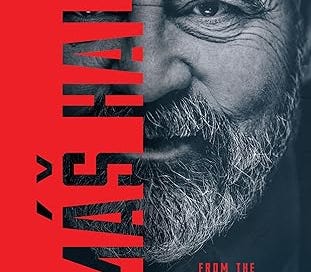Tomáš Halík
From the Underground Church to Freedom
(Indiana: University of Notre Dame Press, 2019)
I’ve just finished reading an amazing autobiography by the Czechian Catholic priest Father Tomáš Halík. He was a very important figure in the underground church and a towering figure in post-Communist Czechoslovakia. He has lectured all over the world, written numerous books, received multiple honorary doctorates, and won the Templeton Prize.
Much of the book focuses on Halík’s role in the underground church in Czechoslovakia in the 50s-80s. He was secretly and illegally ordained in East Germany and for many years kept his ordination a secret in order to engage in clandestine ministry and subversive actions. Czechoslovakia was the lab in which Stalinists tried to implement the complete atheization of society. State-sanctioned forms of religion were permitted, while others were brutally repressed, especially Catholics. It was a time of surveillance, restriction of movement, police murders, interrogations, and an orgy of state violence against its own people. Many sang the song of Karel Kryl, “This will not be as short night - the wolf has a craving for the lamb. Close the gate, little brothers.” In an age of constant propaganda, one had to cling to the saying that “Truth is more than power.” Or, as dissident leader Václav Havel said often in 1989, “Truth and love must triumph over lies and hatred.” Under such conditions, Halík jokes that during the 60s there were more Marxist intellectuals in the West than in the East. Halík was trained as a psychologist and sociologist; interestingly sociology was regarded by the communists as a “bourgeois pseudo-science.”
He was attracted to Christianity because the communists opposed it, but also because he found it intellectually satisfying. He says, “‘Dogma’ ceased to be a bugaboo and a synonym for mental rigidity and became instead an interesting and exciting world.” Halík writes that conversion is like the sunrise, not seeing new things, but seeing everything in a new light. He shares his thoughts on Vatican II, his excitement at the election of a Slavic pope in John Paul II, and opines jealousy among priests. He also expresses his support for married priests, a practice of the Latin church for the first millennium, and maintained today by Catholics of the Eastern Rite.
When he refers to the self-immolation of Jan Palach, a student protestor, he recalls how Palach’s death urged him to achieve the “destruction of Communism using spiritual weapons.” Halík describes the 1968 Spring that was crushed by the Soviets and the eventual fall of Communism in Czechoslovakia in 1989 through the Velvet Revolution. The Velvet Revolution, he boasts, “was marked by wit, laughter, and singing” not with guns or violence. Halík was a friend of the dissident leader Vaclav Havel and would continue to be a close friend and advisor to the new Czech president.
Halík also refers to “cardiognosis” which is the gift of being able to read people’s hearts and speak into their lives (I think Pentecostals might call this words of knowledge). He also makes an insightful comment about Russia: “I fear that Russia will go on being tossed to and fro between dictatorship and chaos, because it lacks the cultural and moral preconditions for building a democratic society.” Halík laments how many of his fellow Catholics were incapable of living without an enemy and now sort to define themselves over and against “The decadent West.”
As he grows older, Halík says that God feels to him both more distant and closer at the same time. He confides in the end that there may be nothing beyond death, but “nothing” is merely a word for referring to the mystery of God.
Otherwise, a fascinating and stimulating read that includes a mixture spiritual pilgrimage and commentary on eastern Europe in the 20th century.





I am interested in this area as my great-grandma and her family came from the Czech/Slovakia area in the late 1800s. I visited the Czech Republic about a dozen years ago, and was struck by the large amount of atheism. I will check out this resource.
Sounds like an excellent biography and snapshot of an amazing era.
This sentence caught my eye: “I fear that Russia will go on being tossed to and fro between dictatorship and chaos, because it lacks the cultural and moral preconditions for building a democratic society.” Which is also why democracy has such little success outside of the West.